Jerri-Lynn here: This is a sequel to a piece I crossposted earlier this week, John Helmer: Zbigniew Brzezinski, the Svengali of Jimmy Carter’s Presidency, Is Dead, But the Evil Lives On. Not only is it a great read, but it’s a useful corrective to fatuous nonsense such as this piece in today’s FT by Edward Luce, Zbigniew Brzezinski and the untimely death of American statecraft, which lauds the quality of Brzezinski’s “strategic brain” and “the meritocracy of intellect [America] nurtured in the cold war.” Help me.
By John Helmer, the longest continuously serving foreign correspondent in Russia, and the only western journalist to direct his own bureau independent of single national or commercial ties. Helmer has also been a professor of political science, and an advisor to government heads in Greece, the United States, and Asia. He is the first and only member of a US presidential administration (Jimmy Carter) to establish himself in Russia. Originally published at Dances with Bears

The widow of Cyrus Vance, the only US Secretary of State to resign in protest against his president’s actions in a hundred years, called Zbigniew Brzezinski, President Jimmy Carter’s National Security Advisor and Vance’s rival, “that awful man”. Not a single official of the State Department under Vance during the Carter Administration of 1977 to 1981, thought differently. Most of them had monosyllabic terms for Brzezinski. Since Brzezinski died last Friday, not a single member of his own White House staff has made a public statement in his honour, memory or defence. The mute ones include Madeleine Albright, who owed to Brzezinski her career promotion as an academic, then White House staffer, then Secretary of State herself.
Despite the disloyalty of those closest to him, and the detestation for Bzezinski of those further away, he was, and remained, Carter’s favourite. Between 1977 and 1981, Brzezinski’s time with Carter, according to the White House logs, amounted to more than 20% of the president’s working time. That’s 12 minutes of every hour — no other official came close. On Friday, shortly after Brzezinski’s death was announced by his family, Carter issued a statement extolling him as “a superb public servant…inquisitive, innovative, and a natural choice as my national security advisor …brilliant, dedicated, and loyal. I will miss him.”
What was this bond between them, and why does it matter now? One reason is that what they did together were the freshest American operations studied at KGB schools in Moscow by a recruit in training at the time named Vladimir Putin.
This was the National Security Advisor’s staff during the four years of Carter’s term, 1977-1981.
PRESIDENT CARTER’S RUSSIA-HATING TEAM
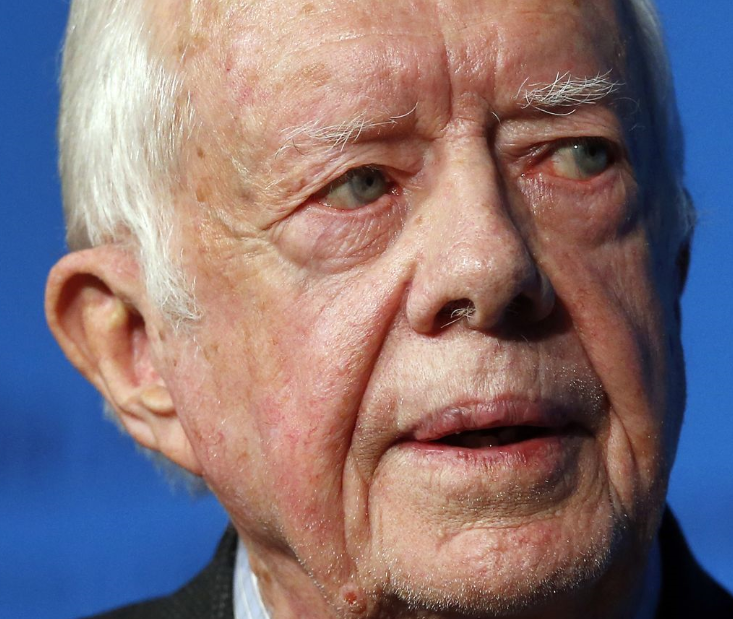
Pictured recently: above, Jimmy Carter. Below – 1st row: Zbigniew Brzezinski (died May 2017); David Aaron; Madeleine Albright. 2nd row: Paul Henze (died July 2011); Donald Gregg; Fritz Ermarth. 3rd row: Robert Gates; Samuel Hoskinson; William Odom (died May 2008).
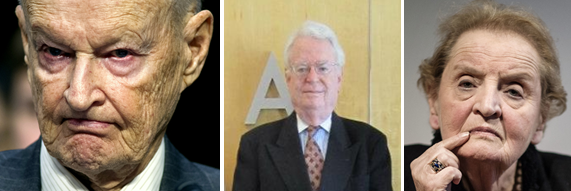
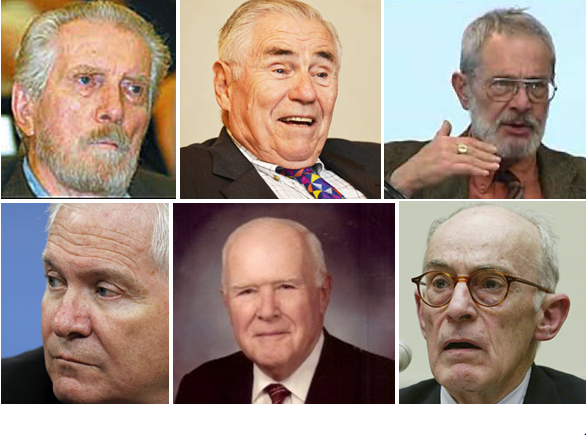
A 451-page doctoral dissertation by Mary Sexton examining the relationship between Carter and Brzezinski identifies the evidence, including documents, witnesses, and independent reports which should have driven them apart. She fails to answer why that didn’t happen. She concludes Brzezinski flattered and fawned over Carter; relentlessly conspired to undermine Vance and other rivals for Carter’s attention; postured, manipulated, lied to the press, and faked to the president. Sexton concluded in 2009: “it is important to recognize that Jimmy Carter was ultimately responsible for the nature of his policymaking system and for the decisions made about who would frame and articulate U.S. foreign policies.”
She quoted Lloyd Butler, Carter’s appointee as the White House lawyer so no Brzezinski underling, as saying he was baffled by Carter’s refusal to address the troubles Brzezinski caused. “I will never understand it”, Butler said in 2002. He died in 2005.
Neither Vance in his memoirs (he died in 2002), nor his wife Grace, nor any of Vance’s deputies at State, nor Carter’s staff at the White House, provide an answer. In research by Betty Glad, published in November 2009, she reported “a few close aides met the emotional needs of the president”, but the aides didn’t tell Glad what they thought Carter’s emotional needs were. Glad acknowledged that in preparing her book she was “above all… indebted to Zbigniew Brzezinski who expeditiously answered my emails and was very open about his interactions with Carter.”
Glad concluded that Carter gave Brzezinski “his complete and absolute support… Brzezinski was one of the few people Carter never reprimanded…And Carter dismissed all criticisms of Brzezinski that might come his way.” Why?
“Carter needed and admired the strategic skills and the toughness in dealing with others that Brzezinski offered,” Glad summed up, with the latter’s help. The need to be tough was a recurrent theme in Brzezinski’s briefings and memoranda to Carter, she added. Brzezinski made Carter feel he was “doing big things.” Fighting the Russians (Soviets then) was, in the advice Brzezinski presented to Carter and repeated to Glad, was the biggest of the big things. “Brzezinski”, concluded Glad, “appealed to Carter’s desire to do new big things and act quickly”.
The bafflement reported by Carter subordinates and State Department officials under Vance is part truth; part cover-up by the officials; part deceit by Carter. For the answer of what bound Carter and Brzezinski together Glad doesn’t uncover, nor even hint at. This is because it was a conspiracy of proxy wars, terrorism, assassinations, coups d’etat, and other black operations, still classified top secret, rationalized by Brzezinski to Carter and approved by the president, as part of a grand strategy to defeat the Kremlin. These were the acting-tough tactics which convinced Carter in secret, but which the president never admitted to in public. Not then, because the actions made Carter feel he was doing “new big things”. Not since, because all of them have failed, with bloodshed and monumental losses for those whom the president and his strategist targeted, and collateral damage for the rest of the world, not least the US.
“Sure, Brzezinski was a strategic thinker,” one of Sexton’s sources told her. “But he was frequently wrong! Vance’s strategies have withstood the test of time.” According to Sexton, her source was a “public official [with] in-depth familiarity with Vance’s and Brzezinski’s work. He agreed to be interviewed…on the condition he would not be quoted on this subject.”
Paul Henze came to Brzezinski’s staff after serving as the CIA’s station chief in Ethiopia in 1969 to 1972, and then in Turkey between 1974 and 1977. Henze had been one of the plotters of the Turkish invasion of Cyprus in July 1974, which continues to this day.
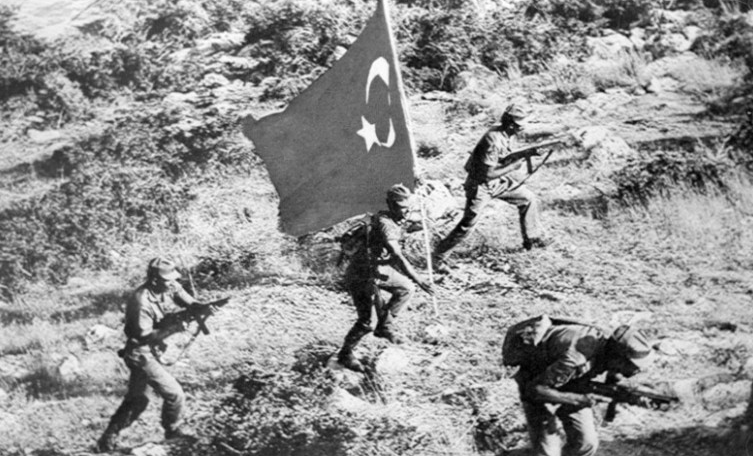
Cyprus: July 20, 1974
The Somali invasion of Ethiopia which began in July 1977, and was known as the Ogaden war until the Somalis were defeated by the Russian and Cuban-backed Ethiopian military in March 1978, was one of the schemes Henze managed, and Brzezinski persuaded Carter to approve. By the time Henze’s war was defeated, he rationalized the war-fighting strategy’s continuing purpose in a memorandum since declassified and quoted by Sexton. “Much as we want the Soviets out”, Henze briefed Brzezinski and Carter, “we are not going to get them out soon…We should make their stay as costly as possible and the source of fundamental strain for them. We can do this in many ways, both overtly [and] covertly… The Soviets are the culprits in the Horn and we should never let them or the world forget it.”
Another of the Henze plots – the military putsch in Turkey in September 1980 – was Carter’s and Brzezinski’s scheme too.
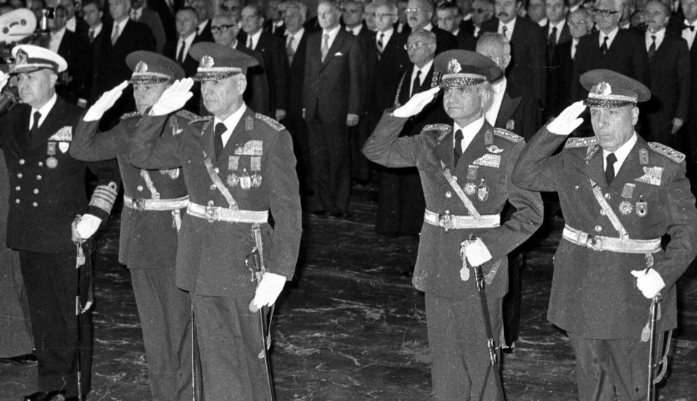
Ankara: October 29, 1980.
Henze had started in the CIA as a specialist managing assassination gangs with pretensions to anti-communist ideology. He began with the Iron Guard of Romania, and was still running the Grey Wolves of Turkey when he moved on to the Brzezinski staff. After Carter’s downfall, Henze spent years trying to cover up the role the Grey Wolves had played in the attempted assassination of Pope John-Paul II in May 1981. Henze’s version of the plot was that the Kremlin and KGB had masterminded the scheme through the Bulgarian secret service. The KGB assessment was that Henze, Brzezinski and Carter had all been in on the plot, just as they had been in on the scheme to elect Cardinal Karol Wojtyła, Archbishop of Cracow, as the Pope in October 1978.
Brzezsinski’s eulogy at Henze’s funeral in Virginia in 2011 provided the cover story that he had engaged Henze in 1977 “to assume responsibility for oversight of the radios and to coordinate more generally our efforts to prevail in the Cold War without an actual war. Paul was in his element. He mobilized his enthusiasm, his commitment, and his boundless energy not only to protect RFE [Radio Free Europe], but to develop also a broader effort to nourish the hopes of those living in the Soviet bloc, including even the Soviet Union itself, that someday they, too, would be free.”
For their combined record of violent failure, Brzezinski had this to say: “Paul proved himself to be a ferocious bureaucratic infighter and eventually the winner – though at times he was even impatient with my efforts to pursue – on the President’s behalf — also some accommodation with the Soviet Union in the area of mutual arms control. But that was Paul, my fellow Cold warrior: enthusiastic, fearless, committed, principled, and relentless. A great American, an Eastern European by association, and one of the anonymous architects of the peaceful and victorious end to the Cold War.”
Henze was joined by other CIA men on Brzezinski’s staff including Donald Gregg, Fritz Ermarth, Robert Gates and Samuel Hoskinson. They were all plotters of the putsch which overthrew the President of Pakistan, Zulfiqar ali Bhutto, in July 1977. Bhutto was replaced by Army General Zia ul-Haq, and subsequently hanged. Zia was killed in August 1988, along with the US Ambassador to Pakistan, Arnold Raphel, and General Herbert Wassom, the head of US military aid mission to Pakistan.
Gregg was one of the plotters of the December 12, 1979, military putsch in South Korea.
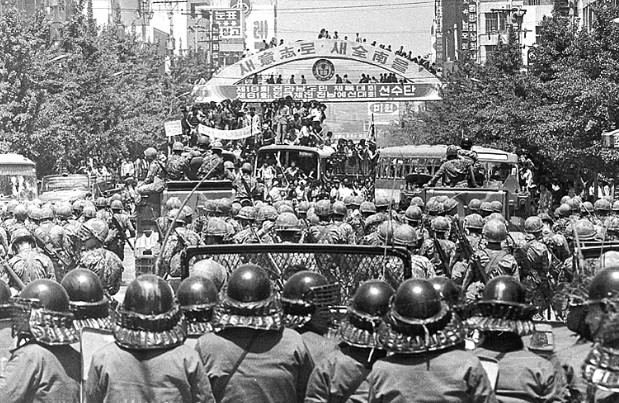
For the declassified evidence, including Gregg’s claim “there are no smoking guns”, read this.
Hoskinson was engaged in Middle Eastern attack and overthrow plots, some he endorsed and assisted, and some he would have done if he judged they had a chance of success.
How many of the putsches which CIA operation histories log in as successful, and how many of the unsuccessful attempts – Ghana and El Salvador (1979), Bolivia, Liberia, Guinea-Bissau, Suriname, Upper Volta (Burkina Faso), Iran (1980) – were engagements in acting tough and doing new big things which Brzezinski got the president to approve are questions Carter is shy to answer.
For them, the war in Afghanistan, which they plotted with alacrity from the start of the Carter Administration, was the culminating case of what Brzezinski described in his address over Henze’s corpse as the “peaceful and victorious end to the Cold War.”
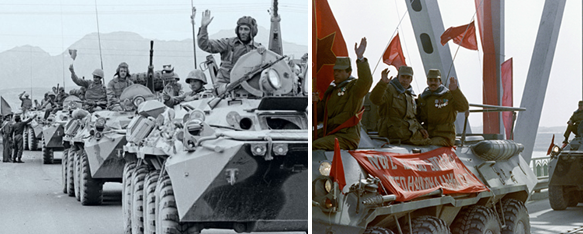
Left: the Red Army enters Afghanistan, December 1979. Right: the Red Army leaves Afghanistan, February 15, 1989.
These games of liquidating others in the cause of defeating the Kremlin has invigorated Carter, even today when Carter himself is on his last legs. Drawing the Russians on to the field of battle was his and Brzezinski’s aim; Afghanistan, after the Soviet military intervention began in December 1979, was their main chance. Their successors in the White House have the same chance against Russian forces on the battlefields of Syria and Ukraine. Though he has tried, Brzezinski is no longer in a position to advise them that if they don’t dare, they can’t win. Carter is still alive to demonstrate that if they dare, they are likely to lose.
It isn’t sure that’s what KGB trainee Putin scribbled down during his lectures at the Andropov Red Banner Institute in 1984. It’s certain he has noted it down now.


Any of us who have served in combat know first-hand that all battles are exercises in chaos. War is chaotic too, but seems to be less so because perceptions are distorted by time, politics and the ability to mask failures.
What I take away from this article is that Cold Wars and their battles are just as chaotic. I never gave that much thought until now.
If all the observations and assertions of fact in this story were to prove true, it sill falls short of explaining whether or not Brzezinski was a psychopathic monster or merely misunderstood because he was a magister ludi. Either way, it is difficult to see how the Brzezinski chapter of history informs current times except to remind that in the background of powerful leaders there are always Rasputins, Brzezinskis, and Bannons.
There seems to me a to be a pretty clear line running from US support of Afghani rebels and the destabilization of Pakistan (with the the overthrow of Bhutto) to 9/11 and the current chaos throughout the greater Middle East.
The point is in the second to last paragraph. The thinking which had us supporting Islamists against the Soviets in Afghanistan also had us supporting Islamists against the Syrians and Iranians and Hezbollah and Russians in Syria. I know less about the Ukraine, but I gather our role there is less noble than the mainstream press claims.
We are agents of chaos in much of our dealings with the world. The mainstream press may grudgingly admit part of this regarding the past, if distant enough, but almost never admits the continuities between the catastrophes we helped cause in the past and the ones going on now.
I had head some of this before but had forgotten much of it. One thing I don’t buy– as cynical as US officials are, I don t believe the KGB assessment that Carter would have knowingly plotted against the Pope. That he could be persuaded to turn Afghanistan into Russia’s Vietnam is probably true, but I suspect that people in power can persuade themselves that wars fought for glorious causes, like the weakening of the Soviet Union, are justified. Plotting the death of an individual who is the greatly admired leader of the Catholic Church–I can’t see it. Lots of people let their critical senses go down the drain when the word ” war” is mentioned, especially those of us who haven’t been in one. But murdering the Pope–I can’t see Carter doing this, whoever else might have been involved.
I don’t think Helmer claims that Carter plotted to kill the Pope. He claimed, per KGB analysis, that Carter and others of his “team” intervened in the election of a Pope, JP2. The other claim involving the Pope is that one of the CIA/NATO controlled “Gladio” like gangs, the “Grey Wolves” in Turkey, were connected to the attempt on the Popes life, for reasons not stated. The point about the article is that Carter did some really weird things when it concerned Zbig and his fanatical anti-Russian anti-communist scheming – acted in out-of-character ways that baffled those who had known him much longer,like the great statesman Cyrus Vance.
Exactly. If you train, finance, and arm extremists, sometimes they’ll do extreme things, not necessarily to your liking. Chalmers Johnson wrote a book about it.
Oh please. The “they all do it” explanation won’t wash. At the time it seemed like Zbig was Carter’s bid to have his own Kissinger and be a FP wheeler dealer like Nixon. In retrospect it’s pretty obvious Carter was out of his depth on this as on so much else. Of course now he has to defend Brzezinski as what else can he do? To admit this great misjudgment would be to trash his legacy totally.
The conduct of the US’s imperial policy has reflected a struggle between a number of competing interests, but it has been far from chaotic. To argue as much is a big step towards accepting one of the more coarse options the ideology of American exceptionalism serves up, the pop version of realpolitik, as in “it’s a tough, complicated world out there and we can’t begin to understand it so let someone else do it who can protect us.”
Helmer needs to be sifted critically, but some of this is boggling. Did Brz get that much time with JC?
There’s something wrong with the pictures: I don’t believe that’s Madeline Albright as captioned in in row 1.
You’re correct! I dropped a row. Thanks for pointing out the error.
“The Somali invasion of Ethiopia which began in July 1977, and was known as the Ogaden war until the Somalis were defeated by the Russian and Cuban-backed Ethiopian military in March 1978, was one of the schemes Henze managed, and Brzezinski persuaded Carter to approve.”
What exactly was the scheme that Henze managed?
“The KGB assessment was that Henze, Brzezinski and Carter had all been in on the plot, just as they had been in on the scheme to elect Cardinal Karol Wojtyła, Archbishop of Cracow, as the Pope in October 1978.”
No, that wasn’t the KGB assessment.
At least the two items, above that I’ve pulled out of the article are garbage.
A bunch of material from the KGB archives for these time periods came West with the fall of the Soviet Union. I’ve read a lot of that material that covers these two particular items I picked out and the archives don’t support this. I suggest anyone who is interested start with the stuff from Mitrokhin. But lots of other original documents are now online in a number of places.
An alternative, of course, could be that the Carter era anti-Soviet plots where so effective the Soviets have had no clue they were being manipulated?
Ahem. You express opinions and have not in fact identified errors. Since there is no substantiation whatever, and yet you use derogatory terms like “garbage,” you’ve violated our written Policies. You were already in moderation so this isn’t your first offense. You are rapidly accumulating troll points.
Theres no basis for concluding that there ‘s an error in Helmer’s piece, only that some opinionated person disagrees with the conclusions reported from the evidence.
Thank you, Ms Smith (channeling the Colonel.) Clap clap clap!
I wonder if what Carter has and is doing after his presidency is because of guilt from the things he allowed as president? It’s too bad that when people are taught our history they are taught a glossed over version of America is great and does no wrong. Unless someone seriously delves into the study of history the glossed over version is what they know.We see evidence of this currently happening with the removal of Confederate monuments. Another attempt to eliminate any evidence of our past that is negative. If the truth hurts it still need to be told. The average citizen doesn’t have a clue how evil our government was in the past and still is. If you look at the facts you find the US government is the biggest terrorist organization in the world. Democracy is the phony excuse used to justify it. Ike in his farewell address warned us about what is taking place but we ignored his warning. We now live with the consequences.
Well said, jackiebass.
Whether you agree with its merits or not, Zinn’s “A People’s History of the United States” along with Oliver Stone’s “Untold History of the United States” (and there are a few others) are must reads for average Americans. They get away with the whitewashing of history because much of the dirt that was done was in some far away land. Very easy to sweep dirt under the rug when said rug is in another house…
Seems like Brez and Carter are responsible for most of the chaos and instability in the world today.
Why is it those with lofty rhetoric end up being such horrible policies? Perhaps their expressed moral certainty blinds them to the harm caused by their “the ends justify the means” policies….
I think it useful to remember that Carter was a Submariner, a member of an elite class of dedicated Cold Warriors, whose nickname; The Silent Service could shed some light on the mystery that surrounds Carter’s relationship with Brzezinski.
I don’t believe it possible to overstate the degree to which The Silent Service, which is so called not only because submarine warfare is nearly invisible, and physically quiet, but because Submariners are trained/indoctrinated to maintain a seamless dedication to secrecy as concerns every aspect of their service, was, and remains one of the least understood brotherhoods involved in the not-so-cold war.
This service includes working hand-in-glove with our country’s Intelligence services.
From this perspective, it’s no wonder at all that the Intelligence Community had in Carter, a dedicated, and absolutely close-mouthed ally.
I think the nickname came about because of passive sonar. The more noise a submarine made, the easier it was to locate it.
The intelligence usage of submarines by the US against the Soviet Union didn’t really start to the very late 1940’s? Blind Mans Buff is a pretty good read of it all. In addition a number of submariners have read that book and posted online more details about specific missions that are touched upon in the book. So not quite a silent as it used to be in that respect.
Right. Silent Service is about being silent to avoid being sunk so you can sink someone else, not to carry out intelligence.
Here’s the first show of the 50s series at youtube
https://www.youtube.com/watch?v=XHcicudhMPE&ab_channel=Subsim
As I explained, there is in addition, the necessity of keeping one’s mouth shut.
Submariners are fanatical about not talking about when and where they go, where they’ve been and what they’ve done.
My father was a Submariner in the early cold-war era, and had decorations he couldn’t wear, and there were many details of his service he felt he could never talk about even 50 years after leaving the service.
I have talked with a number of his fellows, and they, almost to a man, acknowledged that aspect of their service with a silent nod of the head.
So like I said;
Passive sonar is good. I’m going to completely veer off topic now, and complain about active sonar, which causes permanent damage to marine mammals such as whales. The decibels often exceed 220.
https://en.wikipedia.org/wiki/Marine_mammals_and_sonar
Note to moderator: Sorry; if this is too inappropriate for this context, please delete my comment.
Game, set and match, Bob.
https://twitter.com/madeleine/status/868524128076255232
https://www.ndi.org/publications/statement-ndi-chairman-madeleine-k-albright-passing-dr-zbigniew-brzezinski
Is that really a photo of Zbig with Osama on the Albright comment page?
Unbelievable!
I’ve read that Zbig was mentoring Obama in an unofficial capacity. Could explain a lot.
As someone said about the large crowd at Louis B. Mayer’s funeral: they just wanted to make sure the sonovabitch was dead.
I don’t think that’s Osama bin Laden. He is, after all, wearing a military uniform, and OBL was 6’5″.
In his first paragraph, John writes, “not a single member of his own White House staff has made a public statement in his honor, memory or defence. The mute ones include Madeleine Albright, who owed Brzezinski her career promotion as an academic, then White House staffer, then Secretary of State herself.”
On May 27, 2017 at 10:47AM, Madeleine Albright tweeted:
Many knew Dr. Zbigniew Brzezinski as a brilliant strategist. I knew him as my professor, mentor, and dear friend. I will miss you Zbig.
She attached a 5 paragraph statement to her tweet, where she also said,
“Dr. Zbigniew Brzezinski was one of our most important national security leaders — a man whose actions helped define American foreign policy during the Cold War and whose ideas still influence policymakers today.”
I only fact checked John’s first paragraph.
Despite Twitter now being a preferred communication outlet for our President, it is not considered to be a medium for public statements, particularly for someone at Albright’s level. Social media does not cut it.
She didn’t just tweet a few words. She attached the entire “Statement from Madeleine K. Albright on the Passing of Dr. Zbigniew Brzezinski” which was later hosted on NDI. This is the easy kind of fact checking.
I did see it. The normal use of a Twitter embed for a text statement is to embed something that has been published elsewhere, like an image of a front page. As I said, she was perfectly capable of issuing a press release. I’m hardly of her stature and I would never consider Twitter a proper medium for a condolence for someone I considered important to me. Even my cat got a post.
Why does Helmer conflate the Russia with the Soviet Union?
This piece on Carter, Brzezinski and Cyrus Vance sheds some light as well:
I have posted this before and, at the risk of being repetitive, I’ll do it again because it adds to this discussion. Operation Gladio: The Unholy Alliance of the Vatican, the CIA and the Mafia by Paul L. Williams deals with what the CIA was doing at the time and, according to this, it was the CIA’s need to pivot from the closed down heroin trafficking from the Southeast Asian “Golden Triangle” after we left Vietnam and move into central Asia, Afghanistan, etc., in search of more heroin (poppies) to fund all the CIA covert activities. Brezinski started what is called Gladio B.
I wonder why the Madeleine “worth the price” Albright distanced herself from Brzezinski. She seems pretty ruthless.
Helmer wrote:
I know this because I was a member of the staff in those days. I know because I drafted the terms of a series of staff investigations which Carter requested and then authorized of how the advice he was receiving at his desk was influencing the choices and policy options he had to decide – memoranda from the cabinet departments, briefs from the intelligence agencies, and commentaries from different elements of the White House organization itself.
The investigation of two of Brzezinski’s policy recommendations to Carter was assigned to a US Airforce officer on secondment to the White House staff at the time, Len Vernamonti [6]; and to me.
end quote
In other words, Brzezinski intercepted a report that Helmer wrote at Carter’s request, and did not allow Carter to read it.
And BZ threatened to fire Helmer if Carter ever learned of the report.
I read Helmer’s blog all the time, he is the most knowledgeable english speaking correspondent in Moscow, whether he writes about oligarchs or MH17.
http://johnhelmer.net/zbigniew-brzezinski-the-svengali-of-jimmy-carters-presidency-is-dead-but-the-evil-lives-on/print/
“Carter is still alive to demonstrate that if they dare, they are likely to lose.”
Can Carter publicly demonstrate the “Be Tough” fallacy? Sure. Will he? Likely not. Leon Festinger’s COGNITIVE DISSONANCE model from the early 1950s has yet to be shown fallacious. Carter’s doing so would be a nice career capstone. OTOH we have the Jack Nicolson [as Frank Costello] line in THE DEPARTED: “If ya coulda ya woulda.”